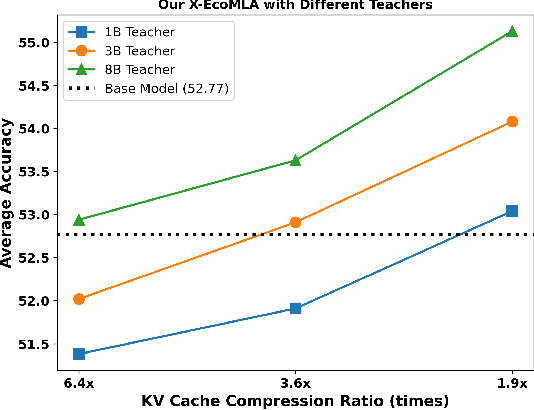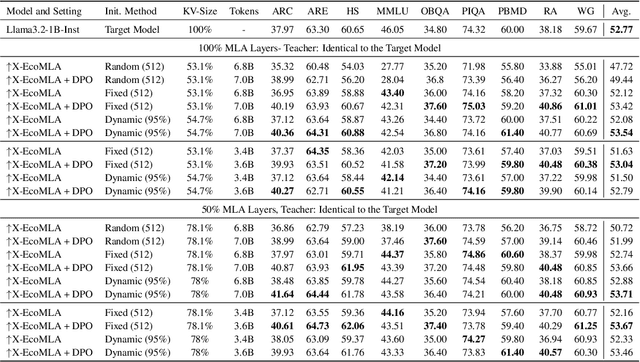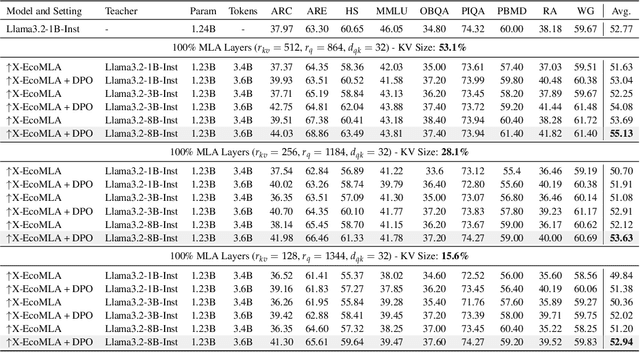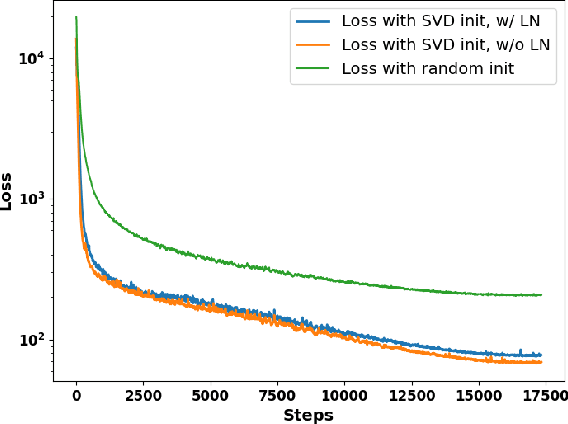Vikram Appia
FarSkip-Collective: Unhobbling Blocking Communication in Mixture of Experts Models
Nov 14, 2025



Abstract:Blocking communication presents a major hurdle in running MoEs efficiently in distributed settings. To address this, we present FarSkip-Collective which modifies the architecture of modern models to enable overlapping of their computation with communication. Our approach modifies the architecture to skip connections in the model and it is unclear a priori whether the modified model architecture can remain as capable, especially for large state-of-the-art models and while modifying all of the model layers. We answer this question in the affirmative and fully convert a series of state-of-the-art models varying from 16B to 109B parameters to enable overlapping of their communication while achieving accuracy on par with their original open-source releases. For example, we convert Llama 4 Scout (109B) via self-distillation and achieve average accuracy within 1% of its instruction tuned release averaged across a wide range of downstream evaluations. In addition to demonstrating retained accuracy of the large modified models, we realize the benefits of FarSkip-Collective through optimized implementations that explicitly overlap communication with computation, accelerating both training and inference in existing frameworks.
Zebra-Llama: Towards Extremely Efficient Hybrid Models
May 22, 2025Abstract:With the growing demand for deploying large language models (LLMs) across diverse applications, improving their inference efficiency is crucial for sustainable and democratized access. However, retraining LLMs to meet new user-specific requirements is prohibitively expensive and environmentally unsustainable. In this work, we propose a practical and scalable alternative: composing efficient hybrid language models from existing pre-trained models. Our approach, Zebra-Llama, introduces a family of 1B, 3B, and 8B hybrid models by combining State Space Models (SSMs) and Multi-head Latent Attention (MLA) layers, using a refined initialization and post-training pipeline to efficiently transfer knowledge from pre-trained Transformers. Zebra-Llama achieves Transformer-level accuracy with near-SSM efficiency using only 7-11B training tokens (compared to trillions of tokens required for pre-training) and an 8B teacher. Moreover, Zebra-Llama dramatically reduces KV cache size -down to 3.9%, 2%, and 2.73% of the original for the 1B, 3B, and 8B variants, respectively-while preserving 100%, 100%, and >97% of average zero-shot performance on LM Harness tasks. Compared to models like MambaInLLaMA, X-EcoMLA, Minitron, and Llamba, Zebra-Llama consistently delivers competitive or superior accuracy while using significantly fewer tokens, smaller teachers, and vastly reduced KV cache memory. Notably, Zebra-Llama-8B surpasses Minitron-8B in few-shot accuracy by 7% while using 8x fewer training tokens, over 12x smaller KV cache, and a smaller teacher (8B vs. 15B). It also achieves 2.6x-3.8x higher throughput (tokens/s) than MambaInLlama up to a 32k context length. We will release code and model checkpoints upon acceptance.
X-EcoMLA: Upcycling Pre-Trained Attention into MLA for Efficient and Extreme KV Compression
Mar 14, 2025



Abstract:Multi-head latent attention (MLA) is designed to optimize KV cache memory through low-rank key-value joint compression. Rather than caching keys and values separately, MLA stores their compressed latent representations, reducing memory overhead while maintaining the performance. While MLA improves memory efficiency without compromising language model accuracy, its major limitation lies in its integration during the pre-training phase, requiring models to be trained from scratch. This raises a key question: can we use MLA's benefits fully or partially in models that have already been pre-trained with different attention mechanisms? In this paper, we propose X-EcoMLA to deploy post training distillation to enable the upcycling of Transformer-based attention into an efficient hybrid (i.e., combination of regular attention and MLA layers) or full MLA variant through lightweight post-training adaptation, bypassing the need for extensive pre-training. We demonstrate that leveraging the dark knowledge of a well-trained model can enhance training accuracy and enable extreme KV cache compression in MLA without compromising model performance. Our results show that using an 8B teacher model allows us to compress the KV cache size of the Llama3.2-1B-Inst baseline by 6.4x while preserving 100% of its average score across multiple tasks on the LM Harness Evaluation benchmark. This is achieved with only 3.6B training tokens and about 70 GPU hours on AMD MI300 GPUs, compared to the 370K GPU hours required for pre-training the Llama3.2-1B model.
 Add to Chrome
Add to Chrome Add to Firefox
Add to Firefox Add to Edge
Add to Edge